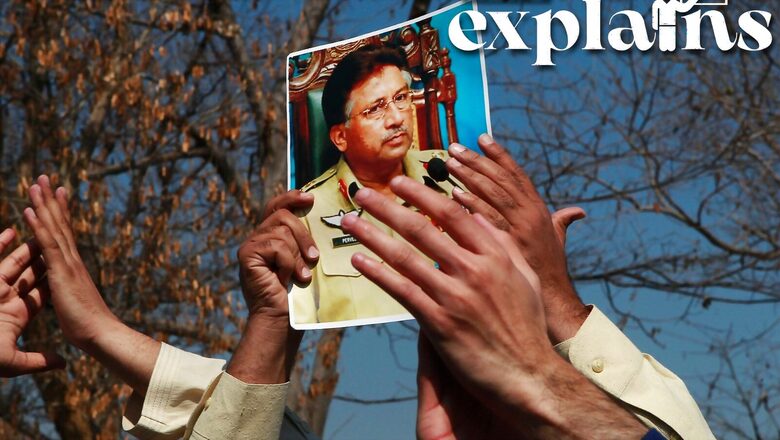
views
Former Pakistani military officer and President Pervez Musharraf has died, sources told CNN-News18 on Sunday. Musharraf, who had taken power in a coup in 1999 and served as president of Pakistan from 2001 to 2008, had been suffering from a prolonged illness.
Musharraf had been in Dubai since March 2016 and was receiving amyloidosis therapy. It is an uncommon condition that manifests when amyloid, an aberrant protein, accumulates in your organs and obstructs their normal function. READ MORE
Who Was He?
At the time of Pakistan’s separation from India in 1947, Musharraf relocated to Karachi with his family from New Delhi. He was a career diplomat’s son who spent 1949 to 1956 living in Turkey.
He enlisted in the army in 1964, attended the Royal College of Defence Studies in London after completing his studies at the Army Command and Staff College in Quetta.
He had a number of positions in the artillery, infantry, and commando groups. He also served as a professor at the Quetta Staff College and the National Defence College’s War Wing. He participated in Pakistan’s wars with India in 1965 and 1971.
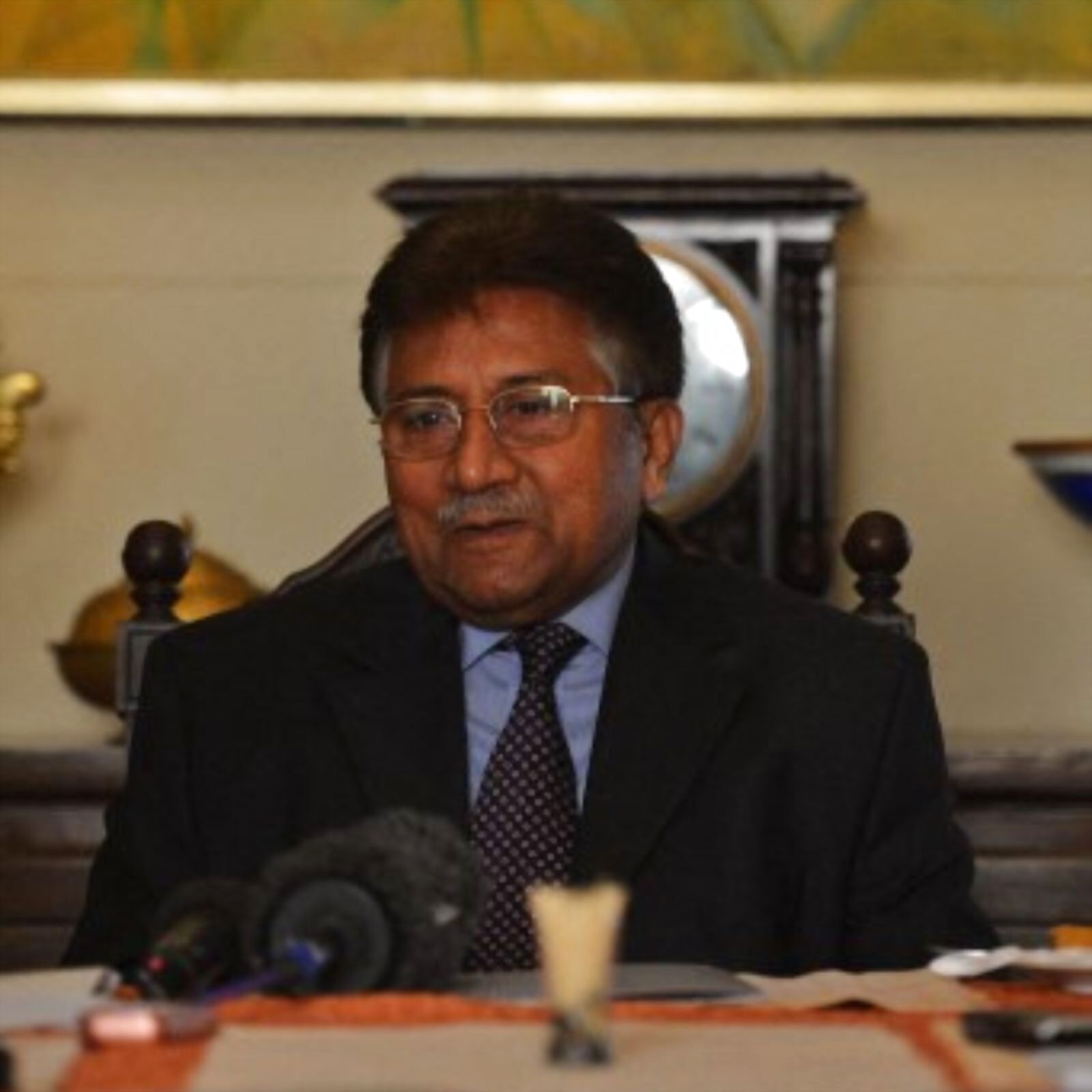
In October 1998, he was named head of the armed forces by Prime Minister Nawaz Sharif. In the summer of 1999, Musharraf is thought to have been a major player in the invasion of the part of the Kashmir territory ruled by India. Following pressure from the international community, Sharif issued an order for the troops to retreat to Pakistani-controlled territory, which infuriated the military.
When Musharraf was out of the country on October 12, 1999, Sharif fired him and attempted to stop the plane that was taking him home from landing at the airport in Karachi.
However, the military overtook the airport and other key government facilities, ousted Sharif, and installed Musharraf as the leader of a military administration. Musharraf dissolved parliament and suspended the constitution despite the fact that he was largely thought to have moderate views and had vowed a return to civilian governance in the future.
To govern Pakistan in the meantime, Khan established the National Security Council, which was composed of civilian and military members. He took office in early 2001 and thereafter tried to reach a deal with India about the Kashmir area. The U.S. government developed tight connections with Musharraf after the September 11 attacks in 2001 and the ensuing U.S. invasion of Afghanistan later that year in an effort to combat Islamic militants in the Afghan-Pakistan border region.
Musharraf survived many assassination attempts during the course of the following years. In 2002, he restored the constitution, but it had been significantly altered by the Legal Framework Order (LFO), which included a clause extending his tenure as president by a further five years. The legislature adopted the majority of the LFO’s provisions in late 2003 after parliamentary elections were held in October 2002.
The Pakistani Supreme Court opposed Musharraf’s bid for reelection as president in 2007, mainly because he was still in office as both the president and the leader of the military. The court rejected his request to have the chief justice suspended, and in October, it postponed Musharraf’s reelection results (by the parliament). Musharraf replied by announcing a state of emergency in November.
He again suspended the constitution, removed the chief justice and other Supreme Court justices, detained opposition political leaders, and established limits on the free press and the media, all in response to escalating terrorist threats.
Later that month, after the newly assembled Supreme Court dismissed the final legal objections to his reelection, he resigned from his position as a general to become president of the United States. Midway through December, Musharraf declared the state of emergency to be over, but not before instituting a number of constitutional amendments to safeguard the policies put in place during the emergency.
Many people interpreted Musharraf’s party’s dismal showing in the legislative elections in February 2008 as a rejection of the president and his reign. Following the elections, an opposition coalition led by Sharif and Asif Ali Zardari, the widower of the deceased former prime minister Benazir Bhutto, emerged. Early in August 2008, the ruling coalition moved to start the impeachment process against Musharraf, citing significant constitutional infractions. Faced with the imminent accusations, Musharraf tendered his resignation on August 18.
Living in Dubai, Musharraf was facing treason charges for suspending the Constitution in 2007 over the imposition of extra-constitutional emergency, a punishable offence for which he was indicted in 2014.
He suffered from Amyloidosis and was being treated in Dubai.
EDUCATION
He studied at Saint Patrick’s School in Karachi. Later, he studied mathematics at Forman Christian College in Lahore and at the Royal College of Defence Studies in the United Kingdom.
PAK ARMY: He entered the Pakistan Military Academy in 1961 and was commissioned into the Pakistan Army in 1964. He played an active role in the Afghan civil war.
WAR TO HEAD OF ARMED FORCES: Musharraf was the second lieutenant during the Indo-Pakistan war of 1965. By the 1980s, he was commanding an artillery brigade. In the 1990s, Musharraf was promoted to major general, assigned an infantry division, and later commanded the Special Services Group. Musharraf was promoted to four-star general by Prime Minister Nawaz Sharif in 1998, making him the head of the armed forces.
KARGIL WAR: The former dictator launched the 1999 Kargil war with India without the civilian government’s approval. Aides of former PM Nawaz Sharif said he sought to derail talks with India through the operation. India won the war.
THE COUP: He seized power by ousting PM Nawaz Sharif in 1999 coup. He has also served as Pakistan’s president from 2001 to 2008. Musharraf ruled Pakistan from 1999 to 2008 and lived in Dubai in self-imposed exile since 2016.
THE KASHMIR SOLUTION THAT WASN’T: The 2001 Agra Summit is termed of the greatest missed opportunities of India-Pakistan relations. Former Pakistan Foreign Minister Khurshid Mahmud Kasuri in his book ‘Neither a Hawk nor a Dove’ wrote that the “solution to Kashmir was in the grasp of both governments”. Why, then, did the solution slip away from both New Delhi and Islamabad? Different sides have different theories. Musharraf had proposed what was called the ‘Four-point solution’ to Kashmir. According to different accounts, the solution was, in principle, acceptable to Prime Minister Atal Bihari Vajpayee but the deal fell through hours before the signing ceremony.
The Musharraf plan’s four points were demilitarisation or phased withdrawal of troops, no change of borders of Kashmir, self-governance without independence and a joint supervision mechanism in Jammu and Kashmir involving India, Pakistan and Kashmir.
’20 BOMBS’: In 2019, Musharraf said India could “finish” Pakistan with 20 bombs if Islamabad decides to launch even a single nuclear attack on the neighbouring country.
FUGITIVE: In 2018, Javed Iqbal, a retired judge, accused Musharraf of selling 4,000 Pakistani locals to foreign countries. He has been declared a fugitive in the Benazir Bhutto murder case and Red Mosque cleric killing case.
With Agency Inputs
Read all the Latest Explainers here

















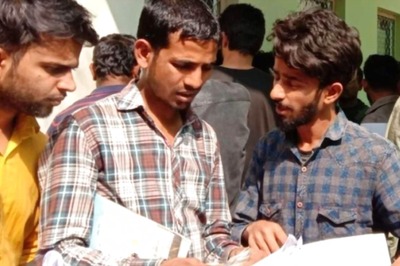
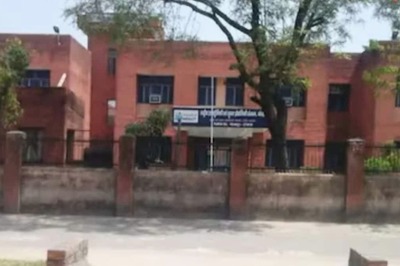
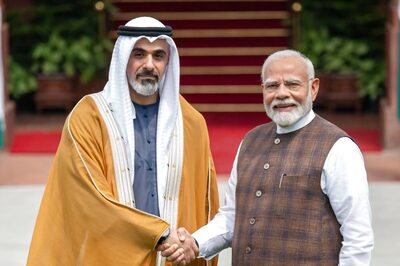
Comments
0 comment